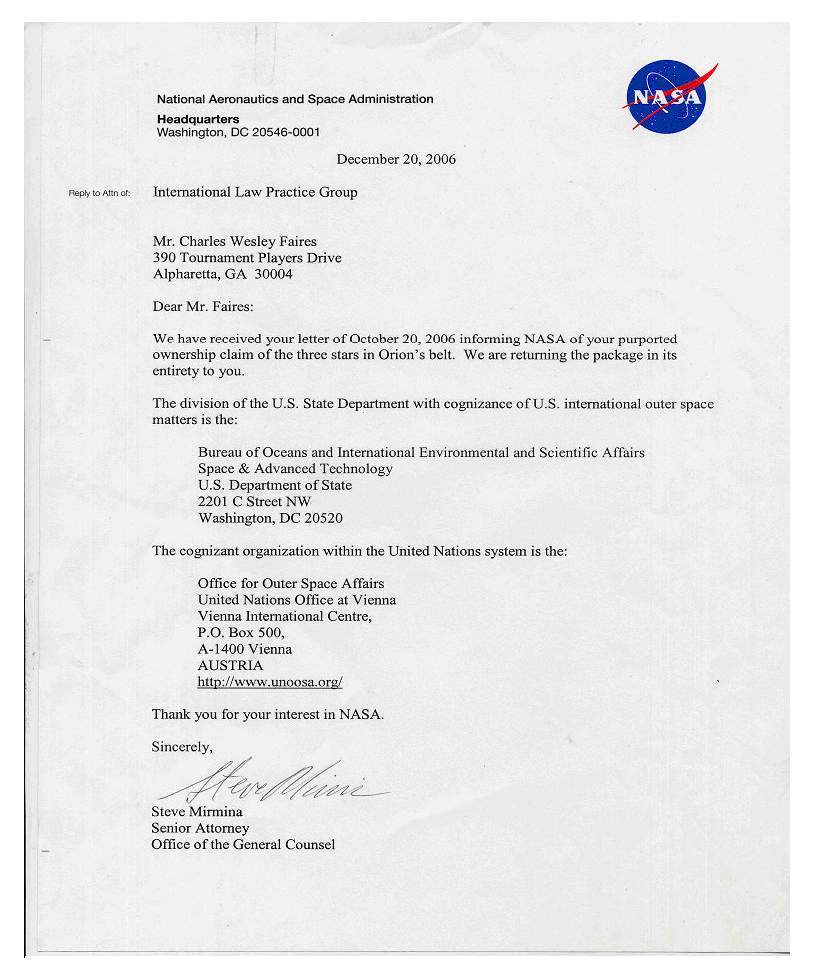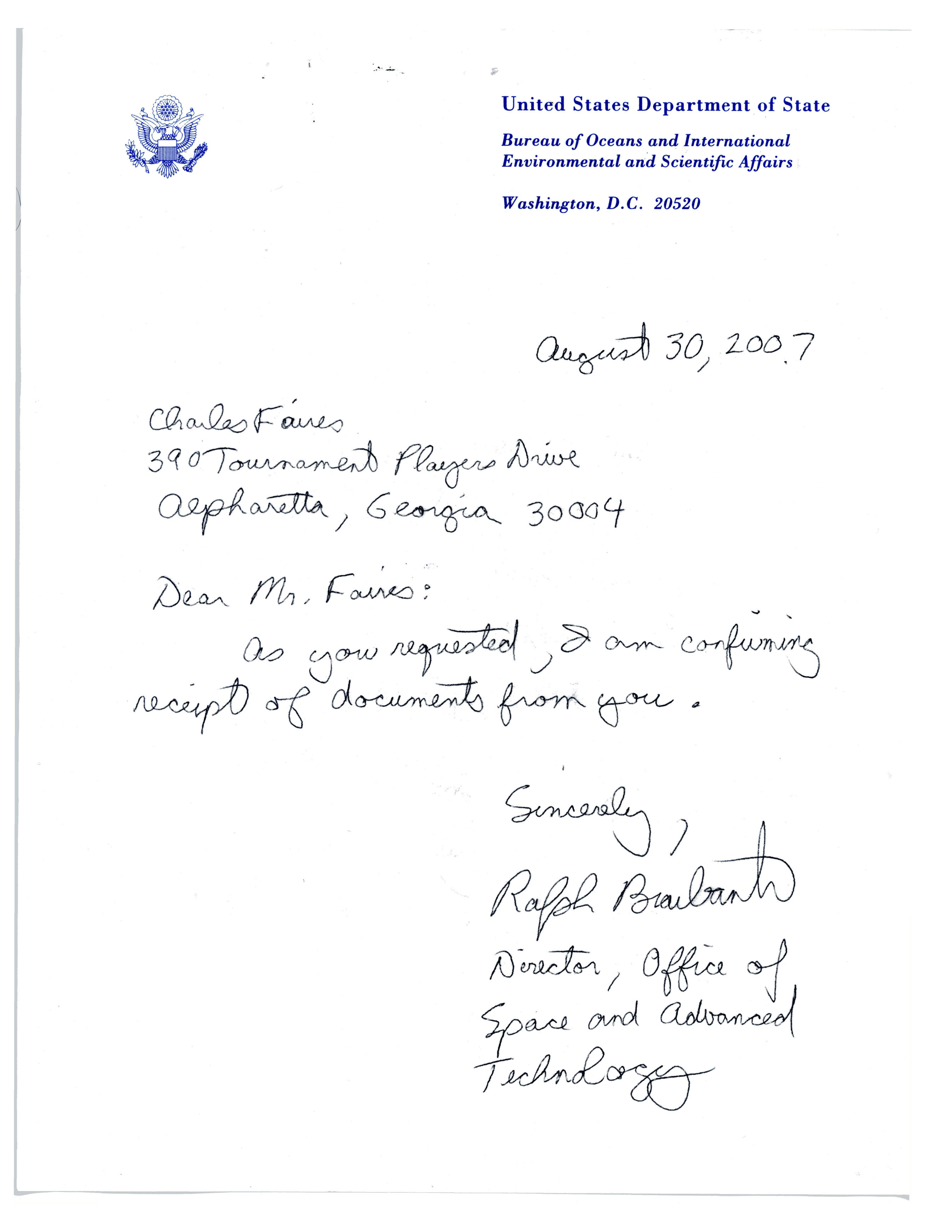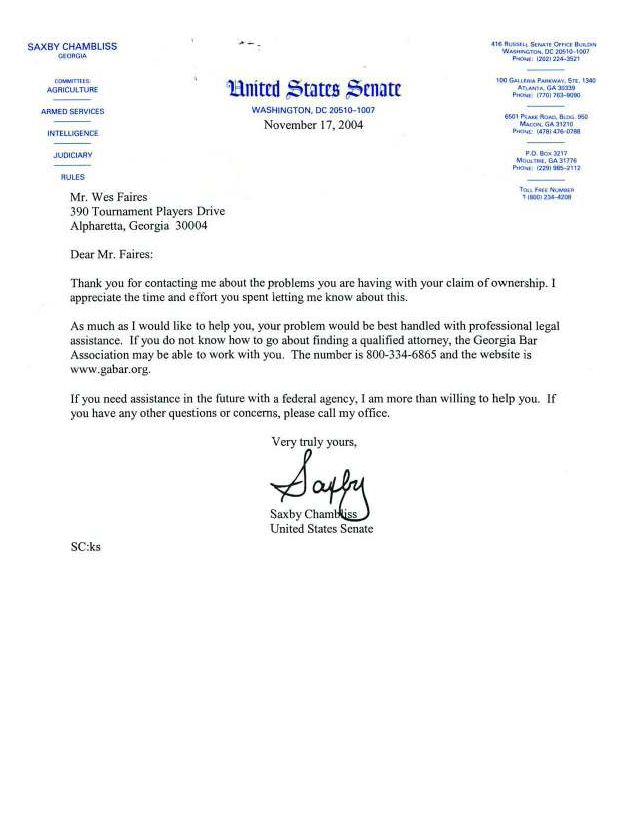Background - Claim of Ownership - Correspondence
History - Claim of Ownership - Orion's Belt
Back in college, in 2003, I was sitting around drinking with some of my buddies and we saw the Conan O'Brien episode where Dennis Hope was explaining how he claimed ownership of the moon. I bet my friend a beer that I could file my own claim of ownership within 24 hours. My mom being in real estate, I was well familiar with the process of filing documents with the Knox. County Properties and Deeds Office. On September 29, 2003 I walked out of a courthouse in Knoxville having filed my claim of ownership to Alnilam, Alnitak and Mintaka – the three stars of Orion's Belt.
So I got my beer, and got on the local news, but as time went on, I realized that I was actually on to something more important.
If there existed an entity to render a formal legal decision, I aimed to find it.
The Outer Space Treaty of 1967 forbid countries but not people from acuiring property in space. The more I looked into space law, the more I realized that the window on humanity's participation in the decision making processes that affect outer space was closing. It wasn't enough to send a few letters out about my claim, and rely on the lack of response to justify it. (As a precautionary measure, I had sent out feelers to the few remaining absolute monarchs on Earth, in the off-chance that one would ignore treaty law and issue some kind of "royal decree" proclaiming my ownership of Orion's Belt) I took things a few steps further, by going around and physically getting confirmation that there was no law or organization, domestic or international, that prevented me from staking such a claim. At each phase, as opposed to asking for "confirmation" or "denial" of my claim, I would request written confirmation of the reciept of my documents, and if applicable, official direction as to what entity to contact regarding the matter. .



I continued over the next 4 years to exhaust every legal option available to me under the current treaty system, ensuring the most widely registered claim to celestial property on Earth. In 2007 I was accepted into The University of Aberdeen in Scotland for an International Law Programme based entirely on my project. This period involved a heavy focus on avenues available through the United Nations to advance private interest in off-planet property rights.
Due to the importance of establishing the voice of the private sector within the United Nations Framework, in 2008, I put my own claim of ow-nership on the back-burner in order to attend the UN Legal Subcommittee on Peaceful Uses of Outer Space - the meeting where space law is drawn up - as a representative of mankind.

Wes Faires at UN Vienna
Despite having Earth's most widely registered claim to off-planet property, with no apparent entity capable of denying it, a 50 year old question still needed to be answered:
Specifically citing that Article II of the Outer Space Treaty rendered no law on Earth to forbid private property claims and that Article VI held nations internationally responsible for supervision of citizens' actions in space, my request was not for "approval" or "denial" of my claim, but official confirmation that my actions were not in violation of the Outer Space Treaty.
The result was the first formal recognition, on this planet, of the legality of a private property claim in Outer Space under the current legislation system, and confirmation that when it comes to territorial sovereignty in Outer Space, mankind is free to move forward, independent of Earth-bound governments.
If there existed an entity to render a formal legal decision, I aimed to find it.
The Outer Space Treaty of 1967 forbid countries but not people from acuiring property in space. The more I looked into space law, the more I realized that the window on humanity's participation in the decision making processes that affect outer space was closing. It wasn't enough to send a few letters out about my claim, and rely on the lack of response to justify it. (As a precautionary measure, I had sent out feelers to the few remaining absolute monarchs on Earth, in the off-chance that one would ignore treaty law and issue some kind of "royal decree" proclaiming my ownership of Orion's Belt) I took things a few steps further, by going around and physically getting confirmation that there was no law or organization, domestic or international, that prevented me from staking such a claim. At each phase, as opposed to asking for "confirmation" or "denial" of my claim, I would request written confirmation of the reciept of my documents, and if applicable, official direction as to what entity to contact regarding the matter. .
Response Letters - NASA, Department of State, Congress
In 2006 I received a letter from NASA's lead attorney indicating that the appropriate competent authorities were The Bureau of Oceans (US Dept of State) and the Office of Outer Space Affairs (UN-Vienna). I had determined that both these offices were only capable of “administrative opinions”. It was at that point that I decided my role in all this was to confirm, directly from the source, whether a private claim of ownership in Outer Space was in an of itself a violation of the Outer Space Treaty. In tracking down the “source” and determining the legal approach that would place this in question I took an avenue that had yet to be taken.


I continued over the next 4 years to exhaust every legal option available to me under the current treaty system, ensuring the most widely registered claim to celestial property on Earth. In 2007 I was accepted into The University of Aberdeen in Scotland for an International Law Programme based entirely on my project. This period involved a heavy focus on avenues available through the United Nations to advance private interest in off-planet property rights.
United Nations- Correspondence and Attendance
The fact that a claim such as this had never been officially rendered in violation of or in compliance with the current legal framework motivated me to target the United Nations Office of Outer Space Affairs (UNOOSA). The correspondence recieved from the UNOOSA indicated that the U.N. as a whole was not capable of rendering such decisions on legality of space claims - they could merely repeat the law as it states on their books.Due to the importance of establishing the voice of the private sector within the United Nations Framework, in 2008, I put my own claim of ow-nership on the back-burner in order to attend the UN Legal Subcommittee on Peaceful Uses of Outer Space - the meeting where space law is drawn up - as a representative of mankind.

Wes Faires at UN Vienna
Despite having Earth's most widely registered claim to off-planet property, with no apparent entity capable of denying it, a 50 year old question still needed to be answered:
Are private property claims, under the current Outer Space legislation, legal or not?
My studies had reached a point where a formal decision on the legality of private property under the Outer Space Treaty of 1967 could finally be rendered. In November of 2008, after sending certified letters to the appropriate offices informing them of my intent, I travelled in person to Washington, D.C. to submit my claim of ownership documents for a formal decision by the US Department of State on the documents' compliance with domestic, foreign and international treaty law.Specifically citing that Article II of the Outer Space Treaty rendered no law on Earth to forbid private property claims and that Article VI held nations internationally responsible for supervision of citizens' actions in space, my request was not for "approval" or "denial" of my claim, but official confirmation that my actions were not in violation of the Outer Space Treaty.
The result was the first formal recognition, on this planet, of the legality of a private property claim in Outer Space under the current legislation system, and confirmation that when it comes to territorial sovereignty in Outer Space, mankind is free to move forward, independent of Earth-bound governments.